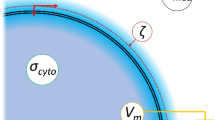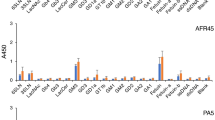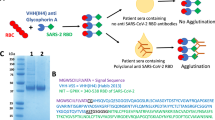Abstract
Rapp and Borsos1, in their study of the effects of low ionic strength on immune haemolysis, using sheep cells and guinea-pig complement, found that the erythrocytes were haemolysed in the absence of antibody at extremely low ionic strength. The authors gave details for the preparation of a number of isotonic sucrose buffers of various ionic strengths, and the buffers used in this work were those described by these authors.
This is a preview of subscription content, access via your institution
Access options
Subscribe to this journal
Receive 51 print issues and online access
$199.00 per year
only $3.90 per issue
Buy this article
- Purchase on Springer Link
- Instant access to full article PDF
Prices may be subject to local taxes which are calculated during checkout
Similar content being viewed by others
References
Rapp, H. J., and Borsos, T., J. Immunol., 91, 826 (1963).
Stratton, F., Gunson, H. H., and Rawlinson, V. I., Transfusion, 2, 135 (1962).
Muller-Eberhard, H. J., and Kunkel, H. G., Proc. Soc. Exp. Biol. and Med., 106, 291 (1961).
Hinz, C. F., and Mollner, A. M., J. Immunol., 91, 512 (1963).
Author information
Authors and Affiliations
Rights and permissions
About this article
Cite this article
STRATTON, F., RAWLINSON, V. Interaction between Human Serum Complement and Normal Human Red Cells at Low Ionic Strength. Nature 207, 305–306 (1965). https://doi.org/10.1038/207305a0
Issue Date:
DOI: https://doi.org/10.1038/207305a0
This article is cited by
-
Detection of red cell sensitisation by antibody and complement: Current practice and future perspectives
Comparative Haematology International (1993)
Comments
By submitting a comment you agree to abide by our Terms and Community Guidelines. If you find something abusive or that does not comply with our terms or guidelines please flag it as inappropriate.



